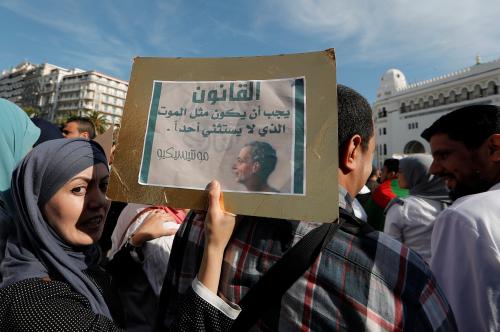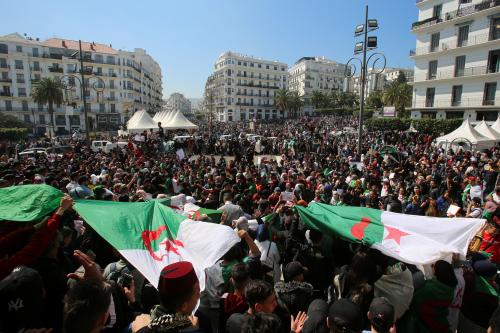On March 26, Algeria’s army chief of staff, Ahmed Gaid Salah, called for the constitutional removal of President Abdelaziz Bouteflika, after nearly five weeks of mass protests against Bouteflika’s rule. While seemingly a major concession to the protesters, Gaid Salah’s proposal is likely an attempt to jettison Bouteflika but preserve the underlying regime. Moreover, this proposal—coming from the army chief—underscores the political role the military envisions for itself moving forward.
President Bouteflika, in power since 1999, has been paralyzed and barely able to speak since suffering a stroke in 2013. The regime nonetheless nominated him for a fifth term last month, sparking nationwide protests against his candidacy beginning February 22. While his candidacy was withdrawn on March 11, it was replaced with the indefinite extension of his fourth term in what protesters viewed as the regime’s bid for time.
As the protests escalated, however, the regime fractured. Members of the ruling parties last week endorsed the protesters’ calls for Bouteflika’s removal. Despite originally warning of chaos and civil war, General Gaid Salah likewise changed his tone, praising the demonstrators for their “noble aims and pure intentions.”
On Tuesday, Gaid Salah delivered what could be the final blow ending Bouteflika’s presidency. Speaking to the 4th military region in Ouargla, Gaid Salah called for the application of Article 102 of the constitution, which outlines a process for President Bouteflika’s removal from office on the basis of his incapacity to govern. Gaid Salah’s appeal for Bouteflika’s removal was reportedly played on loop on state TV.
What happens next?
According to Article 102, the constitutional council must act first to verify that Bouteflika is indeed incapable of governing. The council reportedly met within hours of Gaid Salah’s statement and are expected to announce their decision soon.
If the council verifies Bouteflika’s incapacity, it would then be sent to a joint session of the parliament (both chambers). If two-thirds of the parliament approve the president’s “state of incapacity,” the president of the Council of the Nation (the upper house), Abdelkader Bensalah, would become interim president. If Bouteflika is still incapable of governing after 45 days, interim president Bensalah would have an additional 90 days to organize new presidential elections. In other words, by this roadmap, there would be new presidential elections within 4.5 months of Bouteflika’s removal. According to Article 104, the current government, led by Prime Minister Noureddine Bedoui, would remain in office during this time.
On the one hand, the application of Article 102 meets some of the protesters’ core demands: the removal of President Bouteflika and new presidential elections. On the other hand, it preserves the current government and appoints a regime loyalist as interim president, while providing no guarantees of free and fair elections nor of political freedoms. It is thus better viewed as an attempt to preserve the system rather than genuinely meet protesters’ demands.
The opposition was accordingly quick to condemn Gaid Salah’s proposal. Human rights activist Mustapha Bouchachi called the application of Article 102 an “outdated” solution, noting that the people would reject proposed interim president Bensalah as “one of the symbols of the power who [helped] manage the country for the past 20 years.” Most opposition parties, including the Rally for Culture and Democracy (RCD), the Movement for Society and Peace (MSP), the Justice and Development Front (FJD), and the Socialist Forces Front (FFS) likewise rejected Gaid Salah’s proposal. The opposition is instead calling for a national unity government to lead the country post-Bouteflika. If protesters turn out again in massive numbers on Friday, it may doom Article 102 as a solution to the political crisis.
The military as guardian
Whether or not Gaid Salah’s proposal succeeds, what this episode has underscored is the political role played by the Algerian military. Gaid Salah’s statement was not a “coup” per se: He did not attempt to remove Bouteflika directly and instead asked for a constitutional process that would grant the removal some semblance of legitimacy. At the same time, a professional, apolitical military would not make a public statement calling for the removal of the country’s president, however popular or constitutional that demand. Instead of leaving politics to the civilians, Gaid Salah is actively trying to find a solution to the political crisis, and one that preserves the military’s interests. As the FFS party noted, “the military institution has not withdrawn itself from politics; it is once again interfering.”
Gaid Salah, and perhaps the officer corps writ large, see themselves as having the right if not duty to intervene in politics. As observers have noted, the Algerian military has historically viewed itself as the guardian or moderator of the political arena, a sentiment said to extend from its pivotal role in the war of independence. The top brass has chosen or approved each of Algeria’s previous presidents, even canceling elections in 1992 when a victory for the Islamic Salvation Front (FIS) seemed imminent.
Gaid Salah’s proposal to remove Bouteflika should therefore be viewed with caution. It is likely an attempt to ingratiate the military and in particular Gaid Salah with the people, a popularity that could help him to ensure the military’s interests are preserved going forward. As I have noted previously, allowing the army to initiate the removal of Bouteflika could help legitimate it as “the savior of the revolution,” complicating a future transition to democracy.
It is commendable that many opposition parties have criticized Gaid Salah’s proposal as representing an unwarranted involvement of the military in politics. These condemnations follow through on an earlier statement by a nascent opposition coalition, the National Coordination for Change, urging the military not to interfere. These actions are promising, as moving forward, a united front against military interference will be essential to a democratic transition in Algeria.
The Brookings Institution is committed to quality, independence, and impact.
We are supported by a diverse array of funders. In line with our values and policies, each Brookings publication represents the sole views of its author(s).







Commentary
Algeria’s army calls for the president’s removal
March 27, 2019